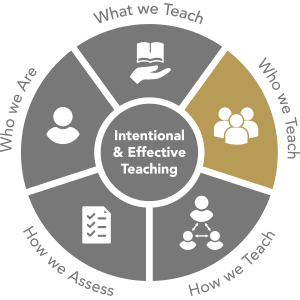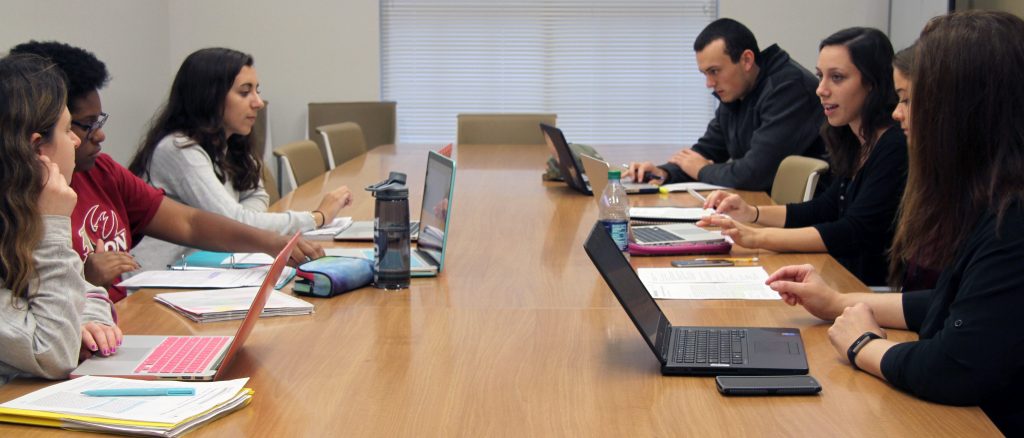Who are the students?
Who are the students?
Get to know them.
It benefits everyone when faculty know their students.
Faculty interest in students as human beings – and individuals – can influence student participation, risk-taking, and persistence. Students are more motivated when faculty connect their course material to their present and future professional interests. Showing concern for students makes faculty seem more approachable, which helps students who have questions.
Although we’ve prioritized positive relationships between faculty and students for a long time at Elon, the scholarship confirms that frequent and high-quality faculty-student interactions matter for academic success. They matter for all students, but especially for students of color and first-generation students.
Understanding groups of students
It’s important that we get to know our students as individuals, but it can also be helpful to know about the experience of groups of students and Elon’s overall student body.
Common sense and personal experience tell us that it’s not easy to be one of a small minority on a campus or in a class and that it’s not easy to belong to any group for which there are stereotypes.
But research tells us that it’s more than just difficult; stereotype threat can negatively impact student academic performance. Learn more about stereotype threat and how you can reduce its impact. Learn about students with international status, disabilities, including autism-spectrum disorder, and LGBTQIA students.
How can you get to know your students?
Having access to student photos in OnTrack can help us begin to learn about our students. Most faculty ask students for additional information in a confidential manner at the beginning of the semester, including both specific questions and open-ended ones.
- Specific questions may include students’ name and pronouns, their contact information, their majors and minors and year in college, where they grew up, whether they’ve taken the necessary prerequisites or other related courses.
- Open-ended questions might ask about students’ motivation for taking the course, concerns they have about the course, something about themselves as a person they’d be willing to share (like what they like to do outside of class), or anything else they think it would be useful for like the instructor to know. Some research suggests that asking students to reflect upon the positive traits that might help them in the class (like skills, attitudes, or experiences, or values) might affirm self-worth and improve learning.
These questions can open the way to pleasant pre-class conversations about personal interests and prior knowledge as well as confidential conversations about the illness of a parent, working two jobs, students’ academic struggles, or how learning accommodations are working. Knowing more about students can lead us to ask about things like how their other classes are going, how things are going with an extracurricular organization or activity they’re involved in, whether they’re feeling better after a cold, how registration is going, etc.
It’s important, of course, that we never publicly share confidential information or never cross professional boundaries.
Resources available: We don’t have to be student’s counselors or confidants; there are professional counselors and other resources available at Elon to help promote mental health and well-being. There are other resources available if
- you are concerned about a student’s well-being or a student is in distress,
- they need learning assistance or
- they have experienced an incident of bias or hate.
- For academic concerns, Academic Advising (or e-warning) can be a good starting places.
- In an emergency or when a student is in crisis, call campus security at 336/278-5555 to figure out where you might direct the student.
Don’t forget to facilitate the students getting to know one another! Interactions and shared tasks build social connections and a sense of belonging, which contributes to motivation and learning. Knowing others helps build trust and community, which makes students more likely to participate and take intellectual risks.

Getting feedback on your classroom interactions with students
Checking in with students to see how they are experiencing your course is always a good idea, and it’s better to do so earlier in the semester when you can make adjustments. You can request CATL to conduct a mid-semester focus group, or design your own anonymous survey to check in matters related to inclusion, equity and climate.
The Center for Urban Education has a tool to assist faculty in thinking about how to observe one another’s classes to consider equity issues related to climate, engagement, communication, and policies. You can download the Observation tool (a pdf) and note that faculty section is in the second half (starting on p. 27).